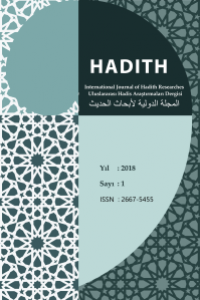Yavuz Ünal. Problem of Method in Determınıng the Ḥadīth (Reasonableness - Irrationality), İstanbul, Etüt Puplications, 1999
Kitap Dr. Yavuz Ünal tarafından yazılmıştır. Kitabın sayfa sayısı: (200) sayfa. Bu çalışma esas olarak hadisleri aklî bir bakış açısıyla ispat etme ve yargılama yöntemlerini ele almaktadır. Çalışma bir giriş ve üç bölümden oluşmaktadır: Giriş: Hadis Uydurmacılığının Başlangıcı Ve Uydurma Rivayetleri Tespitte Dikkate Alınan Kriterler. Birinci Bölüm: İslam Düşüncesinde Akıl Ve Aklîlik. İkinci Bölüm: Rivayetlerin Kaynağı ve Mahiyeti. Üçüncü Bölüm: Rivayetlerin Hz. Peygamber'e Aidiyetini Tespit ve Değerlendirmede Aklın rolü. Kitap bir dizi sonuca ulaştı, bunlar; tüm alimlerin akılla çelişen hadisleri reddetme ilkesini kabul ettiğini. Yine Hadis zaruri ve bedihi olan bilgiyle çelişiyorsa, hadisi reddetmenin mümkün olduğunu. Aynı şekilde hadisin gerçekliği doğrulamak için; Tecrübe, zaman, yer ve özel koşullara ilişkin verilerin kullanılabileceğini ifade eder. Ancak aklın her zaman hadislere hakim kılmanın mümkün olmadığını belirtir, çünkü hadisleri değerlendirirken kullanılan akıl, fıtri akıl değil çevreden etkilenen akıldır ve bu akıl göreceli olduğu için sürekli hüküm verecek bir durumda değildir ki Göreceye dayalı aklın bazı şeylerin makul olup olmadığını koşullara ve zamana göre yargılayabilir, ancak bu yargısı bu durum ve koşula bağlıdır.
Yavuz Ünal. Problem of Method in Determınıng the Ḥadīth (Reasonableness - Irrationality), İstanbul, Etüt Puplications, 1999
The book was written by Dr. Yavuz Unal. Number of pages of the book: (200) pages. This study mainly deals with the methods of proving and judging hadiths from a mental perspective. The study consists of an introduction and three chapters: Introduction: The beginning of fabricating hadith and its criteria for detecting fabricated rumors. Chapter One: Reason and Rationalism in Islamic Thought. Chapter Two: The Source and Nature of Rumors. Chapter Three: The Prophet's Stories Determining Belonging to the Prophet and The Role of Current in Evaluation. The book reached a number of results including: that all scholars accepted the principle of rejecting hadiths that contradict reason. if the hadith contradicts the necessary and explicit knowledge, it is possible to reject the hadith. Experience can also be used to verify the authenticity of the hadith based on the data of time, place, and specific circumstances. But it is not possible to make the mind always the ruler of the hadiths, because the intellect used in judging the hadiths is not the instinctive mind, but rather the mind affected by the environment, and this mind is not a permanent ruler, because it is relative. Although the relativist mind can judge the reasonableness of some things based on circumstances and time, but its judgment is governed by that.
___
- Ünal, Yavuz. Hadisleri Tespitte Yöntem Sorunu (Akla Uygunluk - Akla Aykırılık). İstanbul: Etüt Yayınları, 1999.
- İbn Hanbel, Ahmed. el-Musned. Beyrut: Muessesetü'r-Risâle, 2. Basım, 1999.
